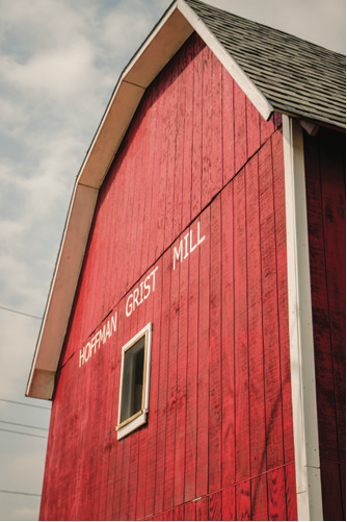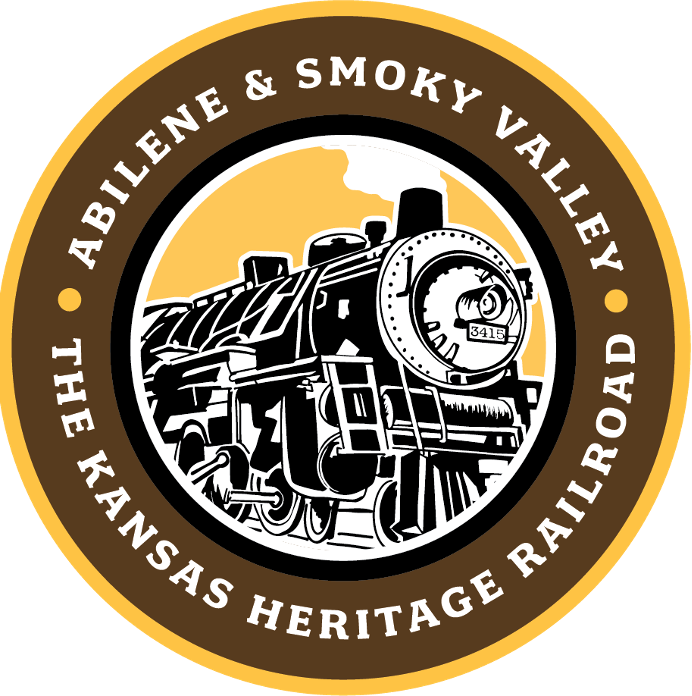The Hoffman Grist Mill:
Turning “Turkey Red” Wheat into gold.

The Abilene and Smoky Valley Railroad serves the Dickinson County community of Enterprise, a community founded in the late 1860s based on the vision of Swedish immigrant Christian Hoffman.
Mr. Hoffman, who had been a miller in his native country, looked at the area surrounding a place called Louden Falls, a location on the Smoky Hill River on the north side of present-day Enterprise. The swiftness of the water rushing over the steep drop in elevation caught his eye as the perfect place to build a dam that could use the force of the rushing water to run a turbine, which could be used to power a stone for grinding wheat into flour. He purchased water power rights in 1868 and built his dam, giving birth to the milling industry in Dickinson County the following year.
The Hoffman Grist Mill initially produced about 60 barrels of flour a day. The mill was the focal point of the area, spawning a small community of settlers, many who worked for Hoffman’s mill. The optimism of those settlers gave birth to the name of the village. In honor of Mr. Hoffman’s indefatigable spirit and the enterprising people who settled in the area, the community was named Enterprise.
Hoffman’s milling business grew. By the turn of the 20th century, the Hoffman Mill was producing 1,200 barrels of flour daily, and his product was sold across the country and was even marketed internationally.
The Hoffman mill spawned the impetus for an industry that was replicated across Dickinson County and throughout the region, thanks to the arrival of the railroads. The Kansas Pacific was built through the region in 1867, although the railroad bypassed Enterprise and instead went through the neighboring town of Detroit located some 2.5 miles north. It was not until 1886 that the Chicago, Rock Island and Pacific was built through Enterprise, just south of the Hoffman Mill on the banks of the Smoky Hill. A year later, the Atchison, Topeka and Santa Fe also entered Enterprise near the mill on the east side.
Although the mill went out of business in 1933, the legacy of Christian Hoffman lives on today. Joe Minnick, the founder of the Abilene and Smoky Valley Railroad and a native of the area, was always fascinated by the Hoffman story, and he began the process of designing and building a replica of the original mill on the south side of the Abilene and Smoky Valley right of way (across the street from Hoffman’s original plant). Minnick located griding stones and other milling equipment that he fashioned into a reincarnation of the Hoffman Mill, resulting in a unique reenactment of the industry that gave birth to a town and brought prosperity to the area.
The Hoffman Grist Mill produces several varieties of flour, including whole wheat, bolted (sifted white flour), and farina (often prepared as hot cereal). The mill also sells whole kernel wheat berries and corn meal, and produces a pancake mix, a seasoned flour, and other special wheat-based products that are popular with tourists and A&SV passengers. Area bakeries also purchase Hoffman flour—one bakery in Abilene, Amanda’s Bakery and Bistro, uses grist mill flour in making the cinnamon rolls that are served on A&SV coffee break trains.
The new version of the Hoffman Mill is a popular attraction for tourists, school children and passengers on the Abilene and Smoky Valley, who tour the mill during the A&SV’s half hour layover in Enterprise.


